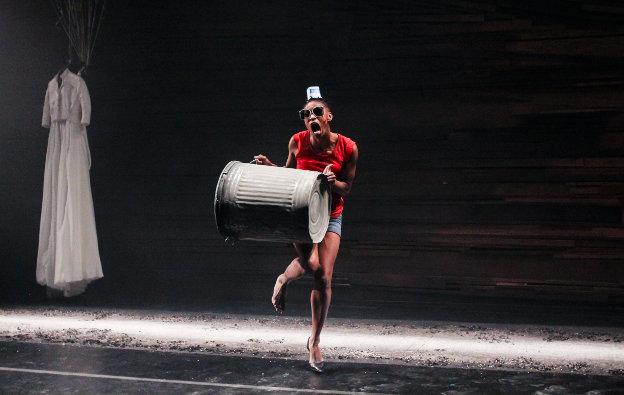
A backdrop of jarred and splintered wood, set at odd angles across the back wall, and a thin gravel path leading to a gathering of dustbins at the side of the stage evokes the backstreets of Cape Town in the studio of the Oval House Theatre.
The lights come up on Mamela Nyamza, who appears suddenly, head down in a dustbin, her legs flailing out the top. Through a mesmerising movement sequence she struggles to find her way out and the piece begins. The story follows the fictional story of Charlie, played by Mojisola Adebayo and the sudden disappearance of her fiancé Zodwa, played by Nyamza, on their wedding day in Cape Town. The play explores the difficulties of being a black lesbian in South Africa, and is dedicated to the numerous lesbian, gay, bisexual, trans and intersex people who have suffered hate, rape and murder.
With such a weighty subject matter Adebayo, who also created and directed the piece, does an excellent job of keeping the atmosphere light, and Nyamza’s dustbin choreography even injects a shade of dark humour in the early sections as she dances with the rubbish bin, copying poses from fashion magazines. Rajha Shakiry’s wonderfully sparse stage design does excellent work in evoking a strange atmosphere that feels both beautiful and dangerous, the splintered wood contrasting perfectly with the wedding dress seemingly suspended in midair by gold balloons.
Charlie addresses the audience as if they were the wedding party, apologising for her partner’s absence. The sold out audience were exceptionally warm to her advances and traces of dialogue began to form between her and the crowd, as they respond to her greeting in an African dialect, and offer pithy comebacks when she sets up a microphone stand and asks, ‘Am I straight?’
The weight, when it arrives, feels all the more heavy as a result as she begins to explain the response of the policeman to whom she reports Zodwa’s disappearance. Embodying the character very convincingly she relates his homophobic and hateful remarks. So begins a shift in the style of the piece, from the suggestive and reflective movement sequences of the first half, to the aggressive and didactic approach Adebayo adopts when she tackles the hatred that lies in the play’s heart.
The shift in tone is not a comfortable one: as she refers to herself in the most hateful terms imaginable it is a far cry from the beautiful wedding imagery we have so far enjoyed. But I suspect this is the aim of such aggressive presentation, to make the audience squirm, to present them with the stark reality of the vicious intolerance that some gay people face.
For Adebayo is preparing us for the cruel end that claimed the life of Charlie’s fiancé at the climax of the story. She presents the facts plainly, as they are, with no need for representation or interpretation. And the grim reality, which was then contrasted by a beautiful movement sequence ending in a tender kiss, left an audience member beside me in floods of tears. And the standing ovation they received at the end was testament to the validity that the piece held with the audience. A powerful and effective piece of theatre that is tackling important issues with both artistic flair and determined force

